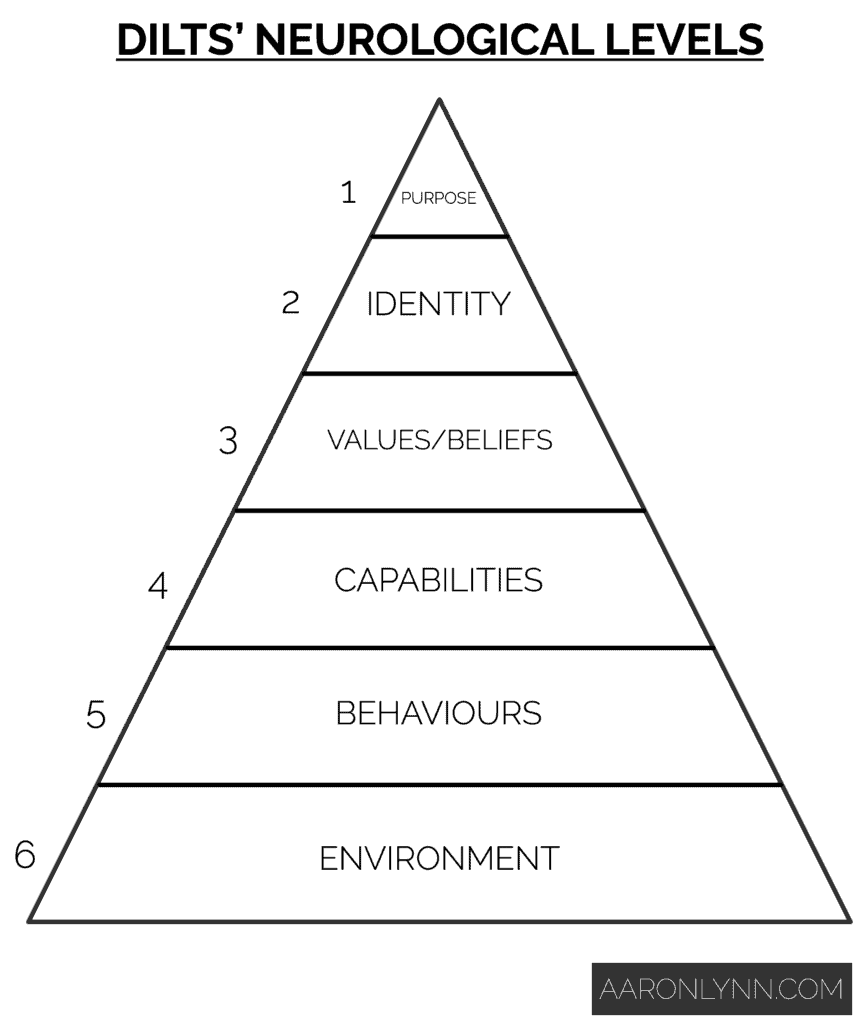
Your core values are the big ideas that you live by.
They are the four-to-six principles and unbreakable standards of behaviour that you hold for yourself.
They are the things you care about.
Here’s why you need them, how you can discover them, and how you can weaponise them for practical effect.
Why You Need Core Values
Your core values act as the guideposts and principles for your decision making, especially for big life decisions.
You have core values regardless of whether you are consciously aware of them or not.
For this reason, it is better if you get to choose your core values yourself.
Some core values are conducive to being organised, while some are not.
Some core values will be conducive to your purpose, while others will not be.
How Do Your Core Values Relate to Your Purpose, Inner Game and Mindset?
Core values are part of your inner game and mindset.
They sit under your purpose and identity in this model:
Ideally, your core values will directly support your purpose and identity.
How to Work Out Your Core Values
Working out your core values is a process and a system.
1. Start with a large list of core values
If you don’t have any immediate ideas for what your core values may be, you can start with a large list.
I like Scott Jeffrey’s list here, and James Clear’s list here.
Of course if you have some ideas already, you can start with those even if they don’t appear on either list.
2. Go through and note down the most important values to you
Go through either (or both) of the lists above, and your own ideas and note down anything that jumps out at you.
You should end up with ten-to-twenty values.
3. Refine until you have your top five values
Now go over those ten-to-twenty values and note the most important five values to you.
These are the five values that are important to you right now as defined by your behaviour and day-to-day priorities. They are not the five things you would like to be important to you.1Those will come later.
If there are any similar values, you can group them together.
For example, you can group “learning” and “growth” together if they mean the same thing to you.
By the end of this step you should have four-to-six unordered core values.
4. Order your top values
Once you have your list of core values, you need to order them.
Take the first value on the list, and ask if it’s more important than the second value on the list.
If necessary, create an imaginary scenario where you are forced to choose between the two. Decide as-if you need to make that decision right now.
Once you’ve decided between those, repeat the process between the first value, and the remaining values.
From the first round you will be able to identify the position of the first value, and can then assess the values above and below it.
Here’s an example.
Say your list of unordered values is:
- Love.
- Security.
- Growth.
- Self-reliance.
- Integrity.
You start with the first value, love, and compare it with the others:
- Love vs Security, Love wins.
- Love vs Growth, Love wins.
- Love vs Self-reliance, Self-reliance wins.
- Love vs Integrity, Integrity wins.
So now you have:
- Self-reliance.
- Integrity.
- Love.
- Growth.
- Security.
And now compare the values above and values below.
- Self-reliance vs Integrity, Integrity wins.
- Growth vs Security, Growth wins.
Your list now looks like this:
- Self-reliance.
- Integrity.
- Love.
- Growth.
- Security.
You can then do a quick check:
- Is Self-reliance more important than Integrity, Love, Growth and Security?
- Is Integrity more important than Love, Growth and Security?
- Is Love more important than Growth and Security?
- Is Growth more important than Security?
By the end of this step you will have an ordered list of your core values.
5. Write descriptors for your values
Once you have your ordered list of core values, you need to write out a small description of what each core value means to you.
For example, if one of your values is “Health”, then you may write out:
- Almost always well-rested.
- Plenty of energy to the things I want.
- Live well into old age.
All of this can go into your personal notebook.
Reviewing Your Values
You should review your list of core values twice daily:
- In the morning.
- In the evening.
You can do this as part of your morning and evening rituals.
This twice-daily review serves to help you commit your values to heart, and also acts as a check to see if you “got it right” when working out your values.
How to Change Your Core Values
Say you’ve worked out your core values, but have decided that they don’t help you and you want to change them or change their order of importance.
How can you do this?
(We’ll get to the why shortly.)
The easiest way is to simply write out the new list of values and review it daily.
Then to start behaving as-if this new list was true, until it becomes true.
If you know how to use submodality shifts in NLP, you can elicit the submodalities for each core value and then swap in your newly chosen values and fade away the existing core values.2Remember to do an ecology check too.
Both methods work.
Why and How Often to Change Your Core Values
Your core values as they are now are simply the result of your personal history.
You do not want to change your values often—maybe once every few years or after the completion of a life milestone.
If you have never consciously thought about or changed your core values before though, there may be conflicts that make it hard for you to progress towards your purpose and goals.
For example, you may value loyalty and freedom. But it’s hard to be free if you are bound by loyalty towards your friends, family and groups.
Or you may value security and adventure. But it’s hard to live a life of adventure if you value security highly.
This is the real reason for changing your core values: to resolve any conflicts, and better support your journey towards your purpose.
The blunt truth is that some values will help you get to your purpose, while others won’t. People who say that values can’t be changed or that “any values are fine” are flat-out incorrect.
If the values you currently hold are the arbitrary result of the conditioning of your society and family, why should you keep them?
While your values are part of who you are, they are not the entirety of who you are.
Your purpose and identity are quite distinct from your values, so by changing your values you will not “lose yourself” in any way.
How to Weaponise Your Values for Practical Effect
Let’s get practical.
It’s nice and all to have core values, but how can we actually use them to better our lives?
The first practical use of core values is in decision making.
Values can help us cut through all the points and arguments and make a clear decision in what to do, what to ignore and what to say no to.
For example, if one of your core values is health, that means that you value your energy levels and sleep, and this makes it very easy to turn down a night out on-the-town even if it sounds like fun.
The second practical usage of core values is as a check-in for your life.
If you find yourself doing activities that don’t support a value you hold, then you know something is off.
For example, if you say you value health, but you don’t exercise or eat healthily, then perhaps you don’t really value health. Or perhaps another value is overriding that.
The third practical usage of core values is to shape your life processes.
What you do for business or work, what you choose to learn, and how you approach your relationships are all influenced by your core values.
The fourth practical usage of core values is to eliminate the fear of missing out (FOMO) and guilt.
FOMO and guilt are no way to live.
Having either of these in what you do daily will simply make it harder to progress in everything.
If you are clear on what your core values are and there are no conflicts, there will be no FOMO or guilt. Because why would you beat yourself up about something you don’t really care about?
The fifth application of core values is to not share them.
Yes, that’s right—you have no obligation to share your list of values with others.
Your purpose is different. That is worth sharing as that is the why behind what you do.
Your core values are personal to you and how you choose to live your life. You can share if you like, but I would warn that if others are aware of your core values, they can use them to manipulate you if they have the skill and choose to do so.
What To Do Next
Core values are part of your inner game, which you can find out more about here.
They also sit under your purpose, which you can work out here if you don’t know it already.
They are one of eight documents in your personal ops documents, and sit above your standards as well.
If you are in a relationship, your core values will be part of your couples’ strategic plan.
While I won’t be sharing my own core values for the reasons mentioned, some of the themes are part of my manifesto, Evolution. You can download it for free here.
- Those will come later.
- Remember to do an ecology check too.
